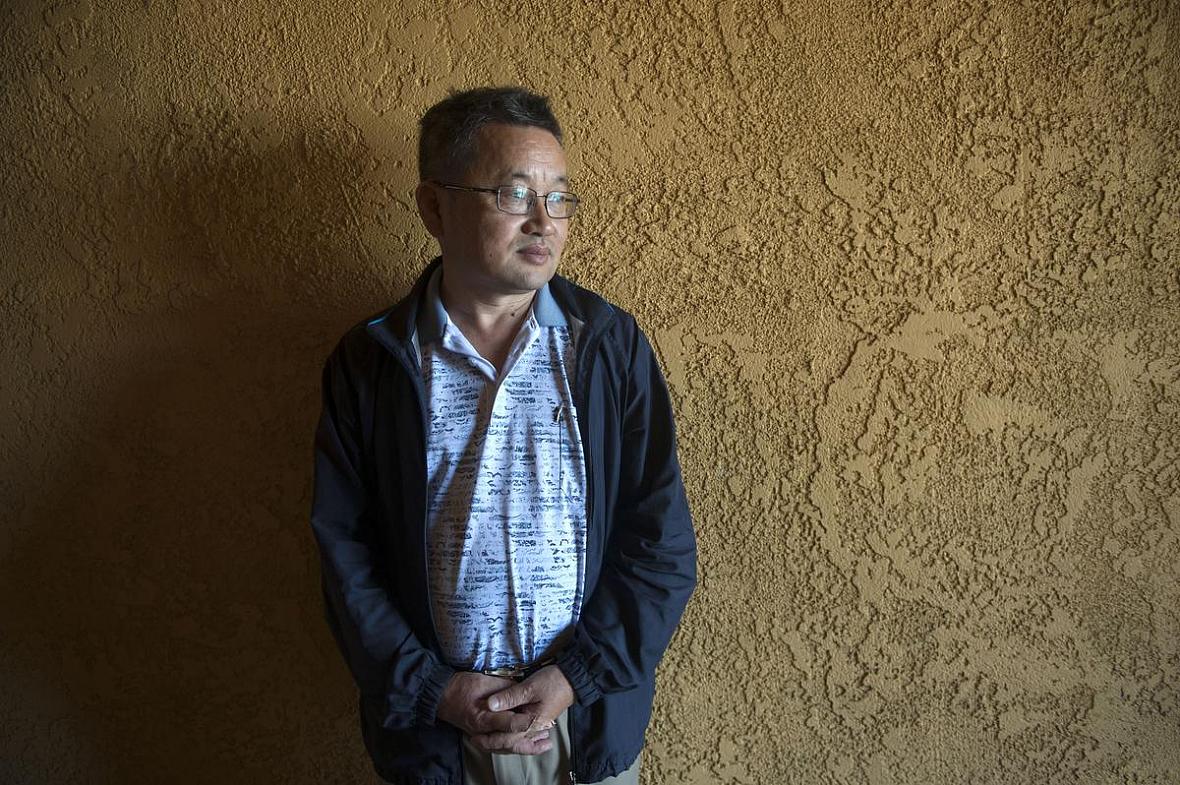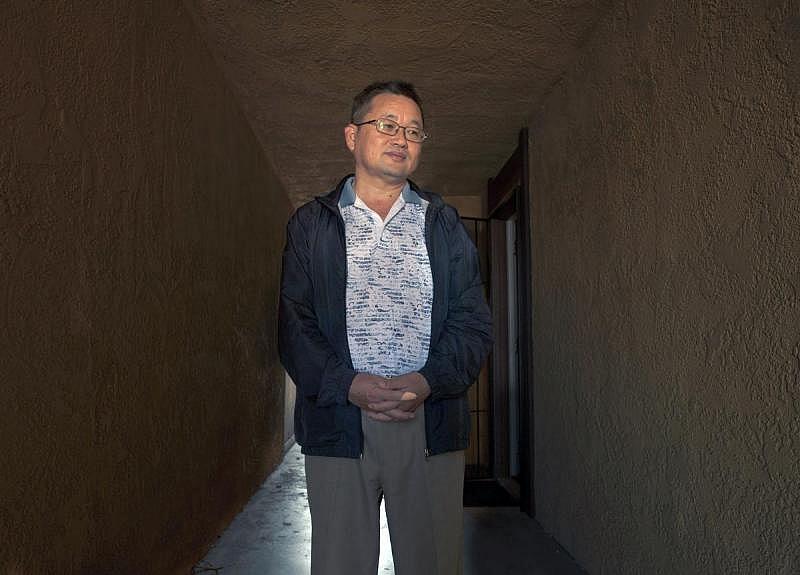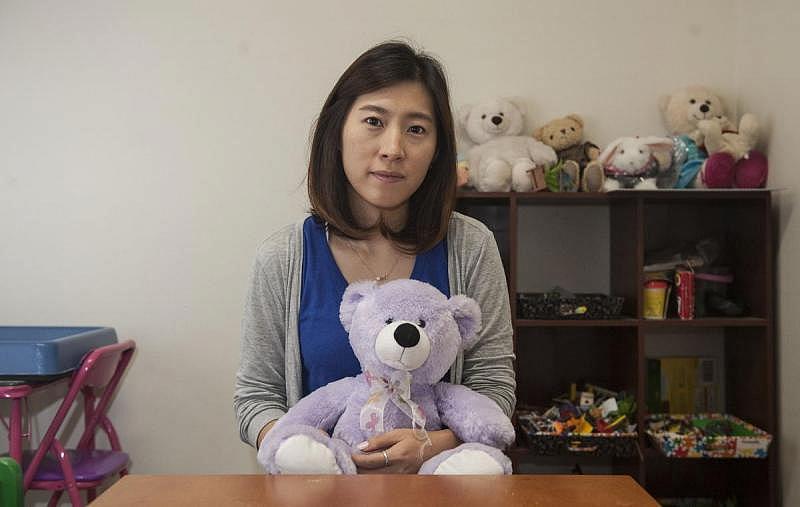Family's experience helps Korean Americans change mindset about mental illness
This article was produced as a project for the California Health Journalism Fellowship, a program of the Center for Health Journalism at the USC Annenberg School for Communication and Journalism.
Other stories in the series include:
'I was too proud to ask for help,' Vietnamese immigrant says of her struggle with mental illness
Art class helps erase stigma of mental illness in Arab community

Kwang Ho Kim, whose son has bipolar disorder, runs mental illness stigma reduction programs for Korean families in Orange County.
The call came a decade ago, from campus police at UC Berkeley, and it was so shocking that Kwang Ho Kim nearly dropped the phone.
Kim’s son, a freshman film major, was being charged with a misdemeanor. The straight-A student had dumped all his clothes on the bed and set them on fire.
Then, the father was told, his boy locked the door to his room and watched the flames.
“Other students had to break down the door to put out the fire and rescue him,” said Kim, 59.
Kim’s son was expelled and soon returned home to Orange County.
Over the next 10 years, Kim and his wife struggled to deal with the aftermath of what happened that day. They lost their money, their home, their status.
But the incident also sparked something else – a shift in the way Korean Americans in Southern California view mental illness.
Kim admits now that the call from Berkeley shouldn’t have been such a surprise.
“I knew what I did when I sent him off to college,” Kim said. “I just didn’t want to accept it.
“I was in denial that my son, the brilliant student, so full of potential ... was actually mentally ill.”
DREAMS AND NIGHTMARES
Kim and his wife came to Orange County from South Korea in 1987.
He initially worked as a salesman for an electronics company, but over the next two decades, Kim and his wife became entrepreneurs, starting and running two Japanese restaurants in Orange County.
They started a family. They bought a home. They went to church. They became respected members of the local Korean American community.
“We were living the American dream,” Kim said. “Life seemed perfect in every possible way.”
That started to unravel in 2006. Kim got a call from a police department in Orange County. His son had been caught driving 80 mph on a surface street.
He was in the hospital, the caller told him.
“Why?” Kim asked.
Police believed his son might have been experiencing a psychotic episode, that he might be mentally ill.
Kwang Ho Kim, who runs Korean Community Services, has seen mental illnesses up close.
To Kim, the concept was inconceivable. In his culture, mental illness wasn’t – and still often isn’t – acknowledged. His response was automatic, and one he’s come to regret.
“All I was thinking at the time was he’s getting ready to transfer out of community college to a university,” he said, adding that his thought was simple.
“He needs to go to college. He can’t be mentally ill.”
Kim also was concerned about his family’s reputation, about its status in the Korean American community.
In Korean culture, acknowledging a mentally ill son in the family could threaten all of that.
So, Kim hired an attorney and threatened to sue the hospital if they didn’t release his son. The hospital complied but let the teen out with a warning. The parents were told to get their son to a psychiatrist and get him appropriate medication.
“I didn’t do either,” Kim said.
Soon, their son was back in the hospital. He’d gone to an ex-girlfriend’s house and broken a window, suffering 200 stitches’ worth of lacerations.
“He said he heard a voice in his head telling him she was in danger and needed to be rescued,” Kim said.
“That’s when I should have taken him to a psychiatrist.
“But I didn’t,” he added. “I bailed him out of jail and sent him off to UC Berkeley.”
CLOSING DOWN
For five years after their son left school, a period when his bipolar disorder landed him in a hospital at least a dozen times, the Kims grew isolated.
Kim’s son talked to himself constantly. He punched holes in walls. He threatened to kill his mother and father.
“Living with him had become unendurable,” Kim said.
Still, Kim refused to seek help.
He also stopped calling family members in South Korea because they would ask him about his son, and he couldn’t muster the courage to tell them the truth. Kim also cut himself off from friends and community.
“Every conversation would come back to how the kids are doing. What was I going to tell them? I didn’t get any help from the community,” he said.
“At that point, all I wanted to do was help my son get better.”
So he did.
Kim turned to the internet, looking for names and stories and information that might address his son’s illness. After several years, Kim said, his family found a helpful doctor. And with appropriate treatment and medication, his son started to get better.
“He still had good days and bad days. But he was definitely improving.”
Kim learned something in the process. The transformation he saw in his son, Kim said, led him to acknowledge something his culture previously had urged him to deny – that mental illness was real and treatable.
“It’s a disease, like high blood pressure or diabetes or cancer,” he said.
“When someone falls sick in our family, we visit them in the hospital. We take flowers to cheer them up and provide moral support.”
But in the Korean community, Kim said, people “tend to shut up and shut down” when they hear the words “mental illness.”
NEW PHASE
Kim said his son’s battle with mental illness didn’t just change the family, it also changed its finances. Kim lost his business, the restaurants, the family home.
About five years ago, when his son got better and headed back to college, Kim pondered a new career. As a father who’d seen mental illness up close – and as a Korean American who understood Korean culture and language – Kim’s qualifications were unique.
Jeehye Kim counsels children in this therapy room at the Korean Community Services in Buena Park.
He took a part-time job counseling mentally ill patients at what was then the St. Anselm’s Cross Cultural Community Center in Garden Grove. A year later, he became a counselor at Korean Community Services in Buena Park.
He felt like he’d come home.
“This was my opportunity to help,” Kim said.
Kim serves as the managing director of Korean Community Services, overseeing counselors and running mental illness stigma reduction programs for Korean families in Orange County.
“When it comes to mental illness, people in the Korean community tend to ask for help only when the situation becomes dangerous or unbearable, like I did,” Kim said.
“They worry about their children being branded ‘crazy.’ They worry about their kids’ education, and about who will marry them,” he said.
“The key is to end this stigma,” he added.
Kim teaches a 12-week class three times a year for families of those with mental illness, classes that focus on stigma, coping methods and treatment options.
He also holds training sessions for pastors, who wield much influence in the Korean community.
“I don’t try to understand mental illness with my head. I do it with my heart,” he said.
“I understand their suffering. I tell them my story and hope it helps them overcome the stigma.”
In May, Kim graduated with a master’s degree in social work from Cal State Fullerton. It came a day after his son got his bachelor’s degree.
[This story was originally published by The Orange County Register.]
[Photos by Ana Venegas/The Orange County Register.]

